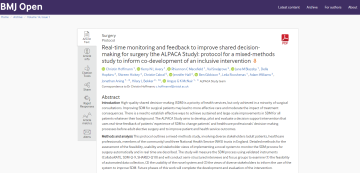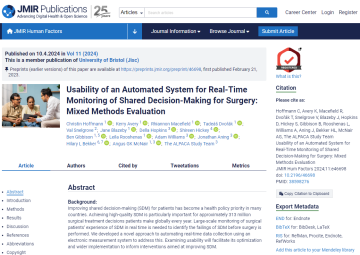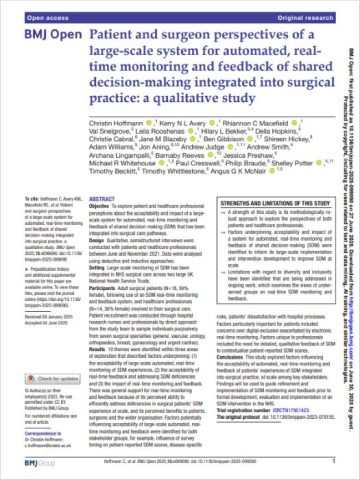The ALPACA study
Theme Surgical and orthopaedic innovation
Workstream Innovative translational research methods
Status: This project is ongoing
High quality shared decision making processes that focus on the patient are an important part of modern healthcare systems.
Shared decision making is when patients and health professionals make treatment decisions together. It is particularly important for patients undergoing surgical procedures because, unlike many medical therapies, the effects of surgery are immediate and irreversible.
This means patients can’t stop treatment even if the benefits they experience fall short of what they expect or the side effects they develop become unacceptable.
Project aims
The overall aim of this project is to develop, pilot and evaluate an intervention that uses new methods to get real-time feedback on patient experiences of shared decision making about surgery. We want to change how shared decision making is done to improve outcomes for both patients undergoing surgery and the health service.
Our work so far
So far, we have established how routine data is automatically collected in several hospitals. We have also investigated the feasibility and acceptability of monitoring shared decision making in real time with the help of an automated electronic patient reported outcome measurement. This is part of a larger study.
We evaluated the effectiveness, efficiency and user satisfaction of an electronic measurement system we adapted to collect patient experiences of shared decision making in real-time. We collected quantitative data, between April and December 2021, from adult patients booked for urgent and elective surgery across seven specialties. Patients were asked to complete a brief survey with some subsequently being asked to take part in an interview.
Overall, users found our system easy to use and the survey quick to complete. Average completion time was three minutes. This suggested good system efficiency and effectiveness. The survey response rate was good and usability amongst patients was high. Findings from the interviews we conducted emphasized good user satisfaction.
However, service users also identified potential barriers to acceptability and ease of access. We are currently exploring how to improve these aspects of the intervention by conducting interviews with under-served groups (elderly, ethnic minority, economically disadvantaged). These groups are thought to experience barriers to accessing our system and are disproportionately affected by poor shared decision making.
We also investigated whether the system is acceptable to patients and surgeons, through interviews with 18 adult surgical patients and 14 surgeons, who had all used the system.
Patients and surgeons said they felt it has the potential to help surgeons better involve patients in decisions about their surgery. They felt it helped surgeons address problems patients identified, efficiently and on a large scale.
What we hope to achieve
Overall, we hope that our work will inform a future randomised controlled trial. The aim of this trial would be to evaluate the effectiveness and cost-effectiveness of real time pre-operative shared decision making monitoring with feedback by comparing it to monitoring alone.

Real-time monitoring and feedback to improve shared decision-making for surgery (the ALPACA Study): protocol for a mixed-methods study to inform co-development of an inclusive intervention

Usability of an Automated System for Real-Time Monitoring of Shared Decision-Making for Surgery: Mixed Methods Evaluation
